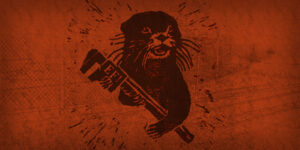
Earth First! has welcomed people taking direct action on social and environmental justice for thirty years. We continue to work hard at making our gatherings places where people can co-exist, collaborate and conspire without hierarchy. The gathering welcomes people with different ideas, experiences, backgrounds, abilities, and identities.
We ask everyone coming to the gathering to read our anti-oppression statement and join with us in working against oppression in all our spaces. We ask too that people listen to each other and show respect – even when we disagree!
About the anti-oppression statement
Many organisations and spaces rightfully try to make themselves more welcoming through a ‘safer spaces’ policy. We have, over time, decided that these can create a false sense of security and can encourage a culture of self-policing. People tacitly agree to these ‘policies’ whilst not actually undertaking the work needed make changes to social relations. Our anti-oppression statement is a call for all of us to consider and transform our behaviours, both on the front lines of our struggles and in our everyday lives.
Capitalism is not a safe space and many of us carry grief, rage and trauma from living in a capitalist, racist, sexist society and from our experiences in political struggles. We believe we can develop and nurture meaningful solidarity between ourselves and others, wherever we are, to create braver spaces.
This anti-oppression statement is not intended as a definitive policy to be adopted by Earth First! or any other group, but merely as an access point into an ongoing conversation that we invite everyone to engage in.
Eco-anarchy in action
As an eco-anarchist group, we understand that how we relate to each informs the way we relate to our ecosystems. Likewise, our environment also affects how we relate to one another. We understand that it is vital to transform social relations so that we no longer behave in ways that are oppressive or exploitative to ourselves, other species or to the planet.
We invite every participant in the EF! gathering to engage in this process of transformation. We see this as part of an ongoing struggle of total liberation – for ourselves, for others and the planet. Rather than leaving it as a moment in a field, it is something that we should take back and develop in our communities and personal lives.
We have all grown up and been socially conditioned in a patriarchal, racist and capitalist world. ‘Unlearning our shit’ is part of creating the better world we know is possible – we all need to take responsibility for it and free ourselves from the conditioning that late-capitalism imposes on us.
Challenging Oppressive Behaviour
It is useful to list some forms of oppression so that we can all take responsibility for confronting them. They include, but are not limited to:
racism, sexism, colonialism, transphobia, homophobia, speciesism, ageism, ableism, classism, xenophobia and violent and abusive behaviour.
Oppressive behaviours do not exist in isolation, but intersect in complex ways. We can also sometimes be unaware that we are acting in oppressive ways. This can include dominating space, silencing other people or dismissing someone’s experiences.
We want to highlight a specific behaviour related to gender identity that is sometimes accidentally enacted. At the gathering we ask people to respect other people’s choice of pronoun and gender-identity. We understand that deliberately and/or repeatedly mis-gendering someone can be harmful and experienced as oppression. In meetings people might ask you what your pronoun is – this means if you want to be referred to as she/her, they/them, he/him etc. Don’t assume someone’s pronoun or gender identity depending on how they look – ask first. We want the camp to be a welcoming space to people of any gender or none.
Acting against oppression is a collective process and we should try to do this as kindly as possible. ‘Calling in’ can be more powerful than ‘calling out’ and means asking people to show solidarity and speaking of the common ground you share. We ask people to try this before ‘calling out’. Remind people to act against oppression in the spirit of comradeship rather than policing each other, as this can be alienating and is often counter-productive. Of course sometimes conflict needs to happen and sometimes people are right to be angry and to express that anger, particularly if it is a result of experiencing oppression.
Balancing needs and navigating tensions can be difficult so bear in mind that everybody makes mistakes and we are all still learning. Remember, solidarity is the weapon of the people!
